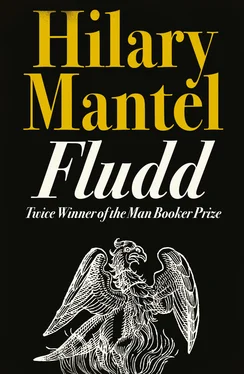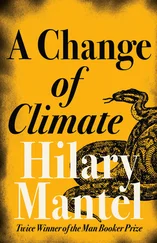‘It’s funny you should ask,’ Father said, just as if she did not ask it every morning. ‘There were a few old Children of Mary, along with the usual derelicts. It wouldn’t be some special feast of theirs, would it? Walpurgisnacht?’
‘I don’t know what you mean, Father. I’m a Children of Mary myself, as you perfectly well know, and I’ve not heard of anything.’ She looked aggrieved. ‘Were they wearing their cloaks and all?’
‘No, they were in mufti, just their usual horseblankets.’
Miss Dempsey brought the teapot to the table. ‘You ought not to make mock of the Sodalities, Father.’
‘I wonder if something has got out about the bishop coming? Some intelligence of a subterranean variety? Am I to have bacon, Agnes?’
‘Not with your stomach in its present state.’
Miss Dempsey poured from the pot, a thick brown gurgling stream, adding to the noise: the dripping trees, the wind in the chimneys.
‘And another thing,’ he said. ‘McEvoy was there.’ Father Angwin hunched himself over the table. He warmed his hands around his cup. When he said the name of McEvoy, a shadow crossed his face, and hovered about his jaw, so that Miss Dempsey, who was given to imagination, thought for a moment she had seen what he would look like when he was eighty years old.
‘Oh yes,’ she said, ‘and did he want something?’
‘No.’
‘I wonder why you mention him then?’
‘Dear Agnes, give me some peace. Go and let me compose myself for His Corpulence. What does he want, do you think? What’s he after this time?’
Agnes went out, a duster in her hand, her face full of complaints. Whatever he had meant about subterranean intelligence, surely he was not accusing her? Nobody but the bishop himself, forming the intention in his deep heart, had known he meant to visit – except perhaps the sycophants might have known. Therefore she, Miss Dempsey, could not know, therefore she could not hint, divulge, reveal, to the Children of Mary or anyone else in the parish. Had she known, she might have mentioned it. Might – if she had thought that anyone needed to know. She herself was the judge of what anyone needed to know. For Miss Dempsey occupied a special mediatory position, between church, convent and everyone else. To acquire information was her positive duty, and then what she did with it was a matter for her judgement and experience. Miss Dempsey would have eavesdropped on the confessional, if she could; she had often wondered how she might manage it.
Left at the breakfast table, Father Angwin stared into his teacup, and shifted it about. Miss Dempsey had not mastered the use of a strainer. Nothing in particular could be seen in the leaves, but for a moment Father Angwin thought that someone had come into the room behind him. He lifted his face, as he did in conversation, but there was no one there. ‘Come in, whoever you are,’ he said. ‘Have some stewed tea.’ Father Angwin was a foxy man, with his dead-leaf-colour eyes and hair; head tilted, he sniffed the wind, and shied away from what he detected. Somewhere else in the house, a door slammed.
Consider Agnes Dempsey: duster in hand, whisking it over the dustless bureau. In recent years her face had fallen softly, like a piece of light cotton folding into a box. Her neck too fell in floury, scalloped folds, to where her clothing cut off the view. Her eyes were round, child-like, bright blue, their air of surprise compounded by her invisible eyebrows and her hair, a faded gold streaked with grey, which sprang up from her hairline as if crackling with static. She had pleated skirts, and short bottle-shaped legs, and pastel twin-sets to cover the gentle twin hummocks of her bosom. Her mouth was small and pale and indiscernible, made to ingest the food she liked: Eccles cakes, vanilla slices, miniature chocolate Swiss rolls that came wrapped in red-and-silver foil. It was her habit to peel off the foil carefully, fold it as thin as a pencil, twist it into a ring, and pop it on her wedding finger. Then she would hold out both hands – fingers bloodless and slightly bent by incipient arthritis – and appraise them, a frown of concentration appearing as a single vertical line at the inner corner of her left eyebrow. Then she would rest her hand on her knee for a little; then remove the ring, intact, and throw it on to the fire. This was Miss Dempsey’s private habit, which no one had ever seen. Above her upper lip, on the right-hand side, she had a small flat wart, colourless as her mouth itself. It was hard for her not to touch it. She was afraid of cancer.
By the time the bishop came bustling in, Father Angwin had got over his hangover. He sat in the parlour, with his neat ingratiating smile. ‘Father Angwin, Father Angwin,’ the bishop said, crossing the room, and taking him in a grip; hand squeezing upper arm, hand pumping hand, quite beside himself with joviality, and yet those episcopal bifocals glinting and swimming with suspicion, and the episcopal head turning, turning from side to side, like a mechanical toy that you shoot for at a fair.
‘Tea,’ Father Angwin said.
‘No time for tea,’ said the bishop. He took up a stance on the hearthrug. ‘I’ve come to talk to you on the subject of uniting all right-thinking people in the family of God,’ he said. ‘Now then, now then, Father Angwin. I’m expecting trouble from you.’
‘Are you going to sit, or what?’ Father Angwin asked him diffidently.
The bishop clasped his pink hands before him. He looked severely at the priest, and swayed a little on the spot. ‘The next decade, Father Angwin, is the decade of unity. The decade of gathering-in. The decade of Christ’s human family. The decade of the Christian community in communion with itself.’ Agnes Dempsey came in with a tray. ‘Oh, since you’ve brought it,’ the bishop said.
When Miss Dempsey had left the room – her knees had become stiff, owing to the wet weather, and she was obliged to take her time – Father Angwin said, ‘Do you mean the decade of burying the hatchet, by any small chance?’
‘The decade of reconciliation,’ the bishop said, ‘the decade of amity, the decade of coexistence and the decade of the many-in-one.’
‘You’re talking like a person right outside my experience,’ Father Angwin said.
‘The ecumenical spirit,’ the bishop said. ‘Don’t you feel it in the breeze? Don’t you feel it wafted to you on the prayers of a million Christian souls?’
‘I feel it breathing on my neck.’
‘Am I ahead of my time, or what?’ the bishop asked. ‘Or is it you, Father Angwin, closing your ears and deaf to the wind of change? And you might pour the tea, for I can’t abide tea stewed.’
When Father Angwin had poured the tea, the bishop picked up his cup, and jiggled it in his hand, and took a scalding gulp. Standing before the fireplace, he turned his toes out more widely, and placed his superfluous arm behind his back, and breathed in a noticeable way.
‘Exasperated,’ Father Angwin said, speaking in a low voice, but not to himself. ‘Exasperated with me. Tell me, is that tea hot enough? Good enough? Whisky in it?’ He raised his voice. ‘I hardly understand you at all.’
‘Well,’ said the bishop, ‘have you heard of the vernacular Mass? Have you thought of it? I think of it. I think of it constantly. There are men in Rome who think of it.’
Father shook his head. ‘I couldn’t be part of that.’
‘No choice, my dear man, no choice; in five years, mark my words, or a little more than five…’
Father Angwin looked up. ‘Do you mean,’ he said, ‘that they could understand what we were saying?’
‘Exactly the point.’
‘Pernicious,’ Father muttered audibly. ‘Arrant nonsense.’ Then, louder, ‘I can well understand if you think that Latin’s too good for them. But the problem I have here is their little grasp of the English language, do you see?’
Читать дальше












